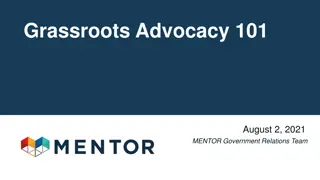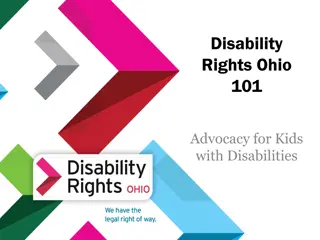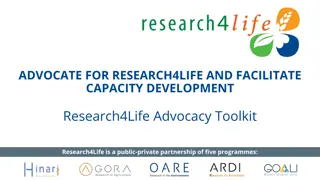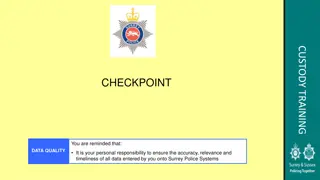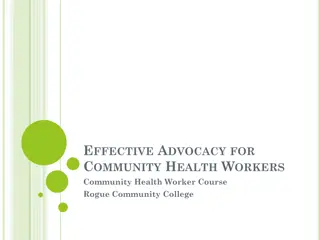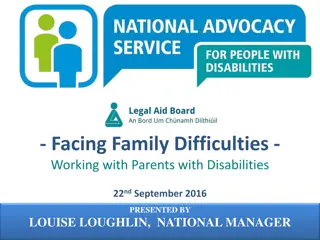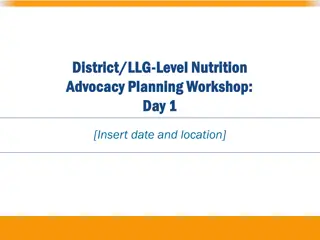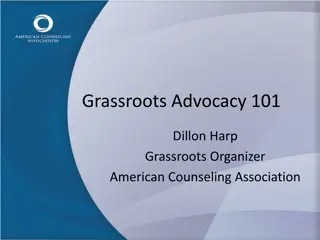Advocacy Services in Surrey: Empowering Individuals in Need
Advocacy services in Surrey, provided by www.pohwer.net/surrey, offer Instructed Care Act Advocacy (CAA), Instructed Independent Mental Health Advocacy (IMHA), and Instructed Non-Statutory Discretionary Advocacy. These services aim to support individuals who have substantial difficulty in understanding and participating in social care processes. Eligible individuals can receive representation and support through Care Act Advocates to ensure their wishes, feelings, and needs are at the forefront of assessment and care planning. Advocacy services play a crucial role in facilitating involvement and empowering individuals in Surrey.
Download Presentation

Please find below an Image/Link to download the presentation.
The content on the website is provided AS IS for your information and personal use only. It may not be sold, licensed, or shared on other websites without obtaining consent from the author.If you encounter any issues during the download, it is possible that the publisher has removed the file from their server.
You are allowed to download the files provided on this website for personal or commercial use, subject to the condition that they are used lawfully. All files are the property of their respective owners.
The content on the website is provided AS IS for your information and personal use only. It may not be sold, licensed, or shared on other websites without obtaining consent from the author.
E N D
Presentation Transcript
Surrey Instructed Advocacy Services www.pohwer.net/surrey
What do we provide in Surrey? Instructed Care Act Advocacy (CAA) Instructed Independent Mental Health Advocacy (IMHA) Instructed Non-Statutory Discretionary Advocacy Definition: Instructed advocacy is when a person is able to tell the advocate what their needs and wishes are and what support they need. They are able to ask the advocate for support and tell them what actions they would like to be taken on their behalf. A case is instructed until we re told by a professional that it s non-instructed.
Care Act Advocacy Advocates can support individuals who are eligible to understand and participate in social care processes relating to the Care Act. Independent advocacy is about giving the person as much control as possible over their life. It helps them understand information, say what they want and what they need. This statutory role is designed to facilitate the beneficiary through the assessment process and ensure they take as full participation as possible.
Duty to Arrange (S67) The LA must arrange for a Care Act Advocate to be available to represent and support the person where: the individual would experience substantial difficulty in understanding relevant information; retaining, using or weighing that information or communicating their views, wishes or feelings There is no appropriate person to represent and support them for the purpose of facilitating their involvement.
Aim of duty The aim of the duty to provide advocacy is to enable people who have substantial difficulty in being involved . to be supported in that involvement as fully as possible, and where necessary to be represented by an advocate who speaks on their behalf The ultimate aim is for people s wishes, feelings and needs to be at the heart of the assessment, care planning and review processes. This needs to be just as true for those who are the subject of a safeguarding enquiry or safeguarding adult review (SAR). 7.5, SG
Who is eligible for Advocacy under the Care Act? Not everyone is eligible for a Care Act Advocate. There are 2 qualifying criteria: the person has substantial difficulty in being fully involved with their assessment, care and support planning and review or safeguarding there is no one appropriate and available to support their engagement in assessment process and represent their wishes
In deciding whether an individual has substantial difficulty, the Local Authority must have regard to : any health condition; learning difficulty or disability the individual has; the degree of complexity of the individual s circumstances, whether in relation to their needs for care and support or otherwise; where carrying out an assessment, whether the individual has previously refused an assessment; whether the individual is experiencing, or at risk of, abuse or neglect The Local Authority must also make reasonable adjustments Example: Information in different formats
Who is an appropriate person ? When is it appropriate for other people to represent the person? When should you refer for a Care Act Advocate?
Advocacy under the Care Act The local authority can refer for independent advocacy support for an individual who is deemed to have capacity and who will experience substantial difficulty for any stage of any of the following: section 9 needs assessment; section 10 carer s assessment; section 25 preparing a support / care and support plan; section 27 revising a support / care and support plan; section 42 safeguarding enquiry section 44 safeguarding adults review (SAR)
Safeguarding (Section 68) If a safeguarding enquiry needs to start urgently then it can begin before an advocate is appointed but one must be appointed ASAP Advocate is there to help the person to decide what outcomes they want Understand the behaviours of others that are abuse/ neglect Understand their own actions which could expose them to abuse or neglect Understand what parts of the processes are completely or partially in their control Explain what they want to avoid reoccurring
Who can be referred for advocacy under the Care Act? If the beneficiary meets the 2 statutory qualifying criteria then: Any beneficiaries who are deemed to have capacity to instruct and can consent to advocacy involvement, are responsibility of Surrey and residing in the county, can be referred to POhWER for an Advocate under the Care Act. For persons whom can not instruct their advocate they can be referred to Matrix for non-instructed services
Instructed Independent Mental Health Advocacy (IMHA) Patients who are subject to certain sections of the Mental Health Act 1983, in hospital or the community may be entitled to help from an Independent Mental Health Advocate (IMHA). This service is free, independent and confidential. This service is available to patients who are: Detained under the Mental Health Act (normally in hospital) Informal Patients Subject to Guardianship Subject to a Community Treatment Order (CTO) A conditionally discharged restricted patient.
Instructed Independent Mental Health Advocacy (IMHA) For persons whom can not instruct their advocate they can be referred to Matrix for non-instructed services Out of area provision for: Residents of other Counties or Metropolitan Areas detained in Surrey facilities under the Mental Health Act
Instructed Independent Mental Health Advocacy (IMHA) Hospitals covered: Farnham Road Hospital, Guildford New Spenser Unit, St Peters Hospital, Chertsey Cygnet & Cygnet Lodge, Woking The Meadows, Horton Lane, Epsom Farmfield Hospital, Horley.
Discretionary instructed advocacy Eligibility: The discretionary service will support person s whom are adults at risk (aged 18+) as per definition under Care Act which will include person s living with long term health conditions, or are or may be about to be assessed for social services support under the Care Act. This service is an instructed advocacy service and therefore the person must be able to instruct the advocate with what they want and have capacity to do so, and to provide consent to contact 3rdparties where required. Person s whom are unable to instruct us accordingly and provide consent where required will be unable to access this service.
Discretionary instructed advocacy Adults at risk in Surrey means: Who is 18 years and over Who has needs for care and support (whether or not the local authority is meeting any of those needs) Is experiencing, or at risk of abuse or neglect Who as a result of those care and support needs is unable to protect themselves from either the risk of or the experience of abuse or neglect.
Discretionary instructed advocacy This may include Surrey residents whom fall within one or more of the following non-exclusive groups: Older person Physical disability Sensory disability Learning disability Autism and Asperger s Long term health condition HIV/AIDS Substance misuse Mental health Street homeless
Discretionary instructed advocacy This service will provide support to access NHS Services, that are not covered by the Independent Complaints Advocacy Service (ICAS) (provided by Surrey Independent Living Council), and may include: support to contact and liaise with NHS providers liaison with mental health services, where provided or funded by the NHS support around substance misuse programmes. This service is for people living in Surrey who: are living with HIV facing a mental health crisis or at risk of relapse are receiving substance misuse support.
Discretionary instructed advocacy Liaison with Health services including: General support to contact NHS providers, however we will not provide support to attend medical meetings Liaison with mental health services where provided by NHS Support around substance misuse programmes Support for assessments for person s whom are not eligible for advocacy under the Care Act including safeguarding adults.
Discretionary instructed advocacy Signposting Our Help Hub will aim to provide signposting information to an appropriate service to support referrers where the referral type does not meet our eligibility criteria. Examples where we would aim to signpost people include: Benefits, including ESA and PIP, and income maximisation Housing including neighbour disputes Blue badge application and appeals Complaints against the NHS Liaison with utility companies Legal issues including support to attend HM courts Support to liaise with the Police Support to liaise with private healthcare.
Safeguarding Safeguarding is everybody s business it isn t just something that advocates do to protect our beneficiaries. Because of the nature of our work POhWER has almost a unique role in being able to spot where those in greatest need may be or are at risk and to be the independent voice of our beneficiaries We support people who are going through the safeguarding process as part of our statutory duties but we are also human beings who interact with people as we go about our daily lives. Our Safeguarding duty not only applies to the beneficiaries we support but also to our staff and the people we interact with on a daily basis.
Safeguarding cont... POhWER defines safeguarding as: Safeguarding is a term used in the United Kingdom and Ireland to denote measures to protect the health, well-being and human rights of individuals, which allow people especially children, young people and vulnerable adults to live free from abuse, harm and neglect. Surrey has the legal duty and responsibility for ensuring the safety of people within their area, irrespective of the setting. POhWER are aware of Surrey s safeguarding process and how to raise any concerns we may have, by completing a safeguarding alert form and emailing to ascmash@surreycc.gov.uk
Referral Pathway All referrals must be for instructed advocacy only Professional referrals only for Care Act Advocacy Professional and self-referrals for IMHA Professional and self-referrals for Discretionary Advocacy. Referrals will also be accepted by Advocates when visiting the secure inpatient sites and when working in the community.
Contact us Email: pohwer@pohwer.net Telephone: 0300 456 2370 (charged at your standard network rate) Text: send the word pohwer with your name and number to 81025 Fax: 0300 456 2365 Post: PO Box 17943, Birmingham, B9 9PB www.pohwer.net/surrey Referral forms for all services are available on this page. Opening hours: 8.00am to 6.00pm Monday to Friday
Non-instructed (or Best Interests) Advocacy in Surrey
Who are we? We are a not for profit limited company, founded in 1998 We operate locally-based specialist advocacy services We have worked in Surrey since 1999 We work in close partnership with our statutory partners We promote equity of service, not just equality, diversity and inclusion We promote independence and wellbeing We strive to empower all the people we come into contact with
What is non-instructed advocacy? There are times where people need support to ensure their voice is heard, their individuality, personal preferences and rights respected There are a number of statutory (must be provided) advocacy services in Surrey These require that the person can instruct the advocate What do you do if you suspect the person cannot instruct the advocate for themselves? In this case, a professional must instruct us in the person s best interest called non-instructional advocacy as the client is not the person instructing us
The Mental Capacity Act The Five Principles of the MCA 1: A Presumption of capacity 2: Individuals being supported to make their own decisions 3: Unwise Decisions 4: Best Interests 5: Less restrictive option
Assessing Capacity The Functional Test - Can the person: Understand the information given to them Retain the information long enough to be able to make the decision Weigh up that information Communicate their decision If any of these is a no then the person assessing capacity needs to ask: Is there an impairment or disturbance in the functioning of their mind or brain Is the person s inability to make the decision because of an impairment or disturbance If the second two questions return a yes , then you have assessed the person as lacking the capacity to make that particular decision at the time it needs to be made
What does this mean for advocacy? Certain legislation requires advocacy to be available or offered Advocacy can never be forced onto an adult If a client has been assessed as lacking capacity to make a particular decision, or be involved in certain processes by a professional then they may or must make a referral for non- instructed advocacy
Independent Mental Capacity Advocacy (IMCA) when they must be appointed If a person has been assessed as lacking capacity to make a range of key decisions, and, There is no LPA/Deputy/Court order that covers that decision There is no one appropriate to consult (unpaid) Then the person proposing to make the decision on their behalf must appoint an IMCA The IMCAs role is to ensure the views/wishes/values/beliefs of the person are taken into account in the best interests process The IMCA ensures the MCA is followed They may make suggestions or representations on behalf of the person The IMCA does not make the decision, but can challenge the outcome The key decisions where an IMCA must be appointed are: Changes in accommodation Proposing, withholding or withdrawing a serious medical treatment An application by a care home or hospital for a Deprivation of Liberty Safeguard (DoLS) authorisation WHO CAN REFER: CLINICIANS OR ADULT SOCIAL CARE MUST REFER IF ELIGIBLE
When an IMCA may be appointed (extension roles) Care Reviews an IMCA was involved in an accommodation move a review takes place 6 weeks after the move then annually thereafter. Safeguarding there is a safeguarding enquiry There are protective measures proposed or in force There is not a registered LPA with the power to make this decision The person cannot consent to these protective measures (evidenced by MCA assessment) The person would benefit from the support of an IMCA (appropriate to consult does not apply) It does not matter if the person is the alleged victim or perpetrator Note: Only the decision maker can instruct an IMCA. WHO CAN REFER: ADULT SOCIAL CARE MAY REFER IF ELIGIBLE (THESE ROLES REPLACED BY ICAA)
Independent Care Act Advocacy (ICAA) Eligibility for an ICAA: there must be a proposed assessment/support planning/annual review of their social care, or an open safeguarding There must be no one appropriate to support they must have a substantial difficulty taking part They must be resident in Surrey The social care responsibility is Surrey s (they fund them) or Surrey are leading on the safeguarding enquiry They must agree to the support The referral must come from Adult Social Care For Matrix, they must be assessed as lacking capacity around the specific process or more generally around their social care needs Some notes on Safeguarding and Non-instructed advocacy The support is only for the alleged victim of abuse There does not need to be protective measures (unlike IMCA) so can begin at any stage There does not need to be protective measures proposed or in force (unlike IMCA) It does not matter if there is a registered LPA (unlike IMCA) The support can be though s42 or s44 enquiries, and can include deceased clients WHO CAN REFER: SOCIAL WORKERS OR SOCIAL CARE ASSISTANTS (ADULT SOCIAL CARE) MAY REFER IF ELIGIBLE
Independent Mental Health Advocacy (IMHA) Eligibility for an IMHA: Qualifying Patients under the MHA Does not matter if they have family/friends etc. They must agree to the support of an IMHA Eligibility for a NI-IMHA (Matrix) they must be assessed as lacking capacity around some aspect of their detention (for treatment, understand their rights under the MHA including right of appeal, etc.) Some notes on IMHA and Non-instructed advocacy The role lasts as long as the detention or lack of capacity (whichever is shorter) WHO CAN REFER: NEAREST RELATIVE, AMHP, WARD MANAGER, RGN, RESPONSIBLE CLINICIANS. The Code of Practice states a referral must be made by professional for qualifying patients who lack capacity
Paid Relevant Persons Representative (DoLS) A Deprivation of Liberty Safeguards (DoLS) Authorisation is granted if: A person (the relevant person, RP) is accommodated in a registered care home or hospital (the Managing Authority) They are receiving care and/or treatment They cannot consent to the above (they lack capacity) The only way this can be delivered is so restrictive of their freedoms that it is a deprivation of liberty The Managing Authority applies for a Standard DoLS Authorisation It has been assessed as in their best interests by the Supervisory Body (DoLS Team) A relevant persons representative (RPR) must be appointed once the DoLS is authorised If there is no one willing/able/eligible then a paid RPR must be appointed What does the RPR do? The RPR visits regularly Monitors compliance with any conditions attached to the authorisation makes representations on behalf of the RP to the care home, the Local Authority or ultimately the Court of Protection WHO CAN REFER: ONLY THE SUPERVISORY BODY (DoLS TEAM) CAN APPOINT A PAID RPR
How to refer to Matrix Advocacy Referral forms must be completed We must have written evidence of the lack of capacity If they have family/friends it must be outlined why they cannot be consulted or support the person (IMCA/ICAA only) www.matrixsdt.com referral@matrixsdt.com enquiries@matrixsdt.com 0300 199 0301
And finally Any questions ?









